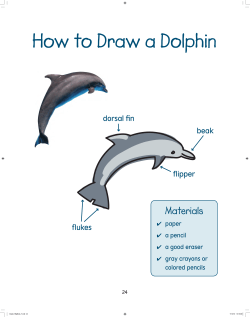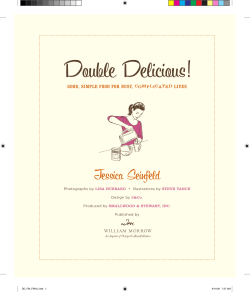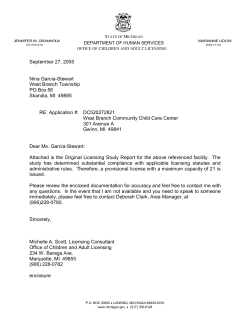
début int act i
Sa m pl e pa ge s début plo ex rations ✽ Mak es s inter ome cu ltural c ac ✽ See o m parison your ow tio s n cultu re thro ✽ Lea ✽ n Greet a ugh ne rn abou nd fare w eyes t comic w e ll b ✽ Find people ooks in ✽ Ask approp out abo France someo riately n u e t ’s b r n ead an in Fran a y m o e u rs is and sa d bake ce y what ries ✽ Ref ✽ Talk lect on a bout w the Oh here yo , là, là ✽ Say u live ! gestu you are re s o rry Before ✽ Use you sta the num rt, turn bers 0 to pag to 10 e 1 of y our Ac tivity B ook. un 1 Quoi de Neuf! 1 SB_01.indd 1 5/04/11 2:33 PM 1 Bande dessinée: Tu habites où ? Bonjour, madame. Bonjour, monsieur. Bonjour, Léo ! Ça va ? bourhood. Nina is new in the neigh m the bakery… She is returning home fro Oui, ça va, merci. Oh non ! Hugo! Mince ! Aïeee ! s 2 pa ge Miiaaoouu ! Ouaf ! Ouaf ! Oh, pardon ! Je suis désolé ! Oh, là, là ! Idiot ! Aïe ! Aïe ! 4 e 3 m pl Ça va ? Mais non ! Ça ne va pas ! Oh, là, là, là, là ! Sa Je suis désolé ! Ça va, ça va. 5 Tu t’appelles comment ? Moi, je m’appelle Nina. Et toi ? 6 Salut, Nina. Je m’appelle Léo. Tu habites où ? J’habite là-bas, rue Boileau … au numéro sept. 6 six Quoi de Neuf! 1 SB_01.indd 6 5/04/11 2:34 PM Et toi, tu habites où ? 8 Oui, au Café de la Poste. Alors, à bientôt, Nina ! Au revoir, Léo. À bientôt. t bu Moi, j’habite ici. Au numéro deux. dé 7 Sa ge m pl e pa Do you read comic books? In France, comics are very popular and are read by people of all ages. You may have read the adventures of Astérix, Tintin or Lucky Luke, all of which were originally written in French. If you visit a library or bookshop in France, you will find an extensive bande dessinée or BD section with hundreds of different comic titles. s Ah bon ? Au café ? Remarquez ! • Take a closer look at the BD BD. What details can you see that suggest this is not an Australian street scene? • Look again at the elderly man in Frame 4. What do you think his body language is saying? You’ll learn more about this gesture on the next page. Clémentine Bouvier, a graphic artist from Lyon in France, has drawn the BD for Quoi de neuf ? With some classmates, you are soon going to choose roles and act out all or part of the BD for the class. To ensure you fully understand the BD and give your best possible performance, prepare by working through steps 1-4 on the following pages. sept Quoi de Neuf! 1 SB_01.indd 7 7 12/04/11 12:58 PM La boulangerie et la baguette m pl Café ou résidence ? e pa ge s Nina was on her way back from la boulangerie when she ran into Léo. The boulangerie is an important part of daily life in France and French bakers bake several times a day to ensure there’s always a supply of really fresh bread. In France, most people eat bread with every meal, and you will often see people queued at the boulangerie prior to mealtimes. They like their bread fresh and crusty in France, which explains why the long thin loaf, known as a baguette, is a favourite – it offers the maximum amount of crust. There are thinner and fatter versions of the baguette (each type with its own name), as well as a multitude of other bread shapes and varieties. Sa Léo’s mother manages the Café de la Poste and the family lives above the café. In the older parts of French cities and towns, it is common for buildings to have a shop or café on the ground floor and apartments above. Et chez vous ? Oh là là ! We often use body language to show what we are thinking and feeling, but does the same body language have the same meaning in different countries? Do all cultures have the same gestures? For example, how did you interpret the man’s gesture in Frame 4 of the BD? French speakers use this gesture to show alarm, concern or distress. To mean the same thing, younger people may simply put their hand to their mouth with a sharp intake of breath. You can say Oh là là ! with either gesture, but the gesture alone will convey the meaning. 8 Is there a gesture you use when you are alarmed or concerned? Réfléchissez ! Do we always alw need spoken la language to communicate? Can you communica think of an any instances when we co communicate without words? huit Quoi de Neuf! 1 SB_01.indd 8 5/04/11 2:35 PM dé t bu Take a look at these French words – you’ll find it easy to guess the meanings. adorable attention chocolat famille grand-parent horrible numéro pardon Now listen to how your teacher pronounces them in French. Surprised? Although French and English share the same alphabet and many words look the same, we don’t pronounce them the same way. French has its own rules of pronunciation, but at least it does follow some rules! Read this poem and imagine you’re a French speaker trying to learn English: And here is not a match for there, And dear and fear for bear and pear. And do and go, then thwart and cart – Come, come, I’ve hardly made a start. Beware of heard, a dreadful word That looks like beard and sounds like bird. And dead it’s said like bed, not bead; For goodness sake, don’t call it deed! A dreadful language? Man alive! I’d learned to talk it when I was five, And yet to write it, the more I tried, I hadn’t learned it at fifty-five. What point is the poet making about English? Poet Unknown m pl e Watch out for meat and great and threat; (They rhyme with suite and straight and debt.) A moth is not a moth in mother, Not both in bother, broth in brother. pa ge s I take it you already know Of tough and bough and cough and dough. Well done! And now you wish perhaps To learn of less familiar traps? a Sa French spelling and pronunciation is quite easy, once you make some basic observations. For example, how is the letter ‘a’ pronounced in French? Listen to your teacher say these words: ça ne va pas salut oh là, là Ah ... je m’appelle là-bas a is usually pronounced ‘ah’ as in the English ‘rather’. Now you try. oi How are the letters ‘oi’ pronounced in French? Listen to your teacher again. quoi (de neuf ) moi toi au revoir Boileau ‘oi’ is pronounced ‘wah’. Now you try the same words. Silent last letters You may have already noticed that the final ‘s’ of some French words is not pronounced, for example: tu t’appelles and tu habites. In French, the final letters of words are often silent. neuf Quoi de Neuf! 1 SB_01.indd 9 9 5/04/11 2:35 PM Learning to speak a new language means listening and imitating what you hear. With your teacher’s help, try saying these new words and expressions from the BD. See if you can find any more examples of silent final letters. Greetings Asking and saying how you are bonjour salut au revoir à bientôt Ça va ? ça va ça ne va pas Exclamations and expressions moi je suis je m’appelle j’habite Mince ! Aïe ! Oh là, là, (là, là) ! Idiot(e) ! Oh pardon ! Je suis désolé(e) ! Ah bon ? pa toi Tu t’appelles comment ? Tu habites où ? Useful words m pl e où ici là-bas o (au) numéro (la) rue Sa madame monsieur et mais oui non merci alors ge Talking to someone else s Talking about yourself When you can confidently pronounce these words, do the Qu’est-ce que ça veut dire ? task in your Activity Book. You’ll remember the meanings better if you work out as many as possible using your powers of deduction. But first, have a class discussion about what sort of clues there are to help you do this. As a last resort, you can use the vocabulary section at the back of the book to look up any meanings you can’t guess. Now return to the BD and listen several more times, imitating the voices until you are confident. Then choose roles and rehearse with some friends before you perform for the class. Remember to include the gesture. 10 dix Quoi de Neuf! 1 SB_01.indd 10 5/04/11 2:35 PM dé t bu 1 Greeting people Would you greet all of these people in exactly the same way? Why?/Why not? • your school principal Good morning, sir. ! y a ’d • your best friend G Howyagoin? • a high court judge Hello. • your grandmother Good afternoon, M ad am . • an adult you’re meeting for the first time Why not give yourself a French name? See page 14 for some ideas. pa ge s There is also more than one way to greet people in French. Look again at the BD to see what greetings and farewells you can find. • Bonjour can be used with people you don’t know well and with friends. It can mean ‘Hello’, ‘Good morning’ or Good afternoon’. • Salut is more casual – like ‘Hi’ – and is used among friends. You can also use Salut to say goodbye to friends – a bit like ‘See you!’ or ‘Bye’. • If you expect to see someone again soon, you can use À bientôt to say ‘See you soon’. • Au revoir is also used to say ‘Goodbye’ and can be used in both formal and informal situations. À vous e With a partner, practise some French greetings. m pl Then try using your own names instead of those in bold. Change roles. Practise more by changing partners. A Bonjour, Nina ! Ça va ? B Salut, Léo. Oui, ça va, merci. A Au revoir, Nina. B Au revoir, Léo. À bientôt. Sa 2 Forms of address How would you translate the words monsieur and madame here? Bonjour, madame. Bonjour, monsieur. • All these forms of address can be used with or without a surname. • The capital ‘M’ and the abbreviations are used only with a surname. • Monsieur (M.) can mean ‘Mr’ or ‘Sir’. • Madame (Mme) can mean ‘Ms’ or ‘Mrs’ or ‘Madam’. • Mademoiselle (Mlle) is another title like ‘Miss’, used to address younger females. How would you translate the words Monsieur and Madame here? Monsieur i LLenoir Madame adame Lenoi Lenoir The words monsieur, madame and mademoiselle are used far more often in French than ‘sir’, ‘madam’ and ‘miss’ are in English. onze Quoi de Neuf! 1 SB_01.indd 11 11 5/04/11 2:35 PM 3 Voice tone When speaking, your tone of voice can be very important in making your meaning clear. For example, try making ‘That’s great!’ mean different things by changing your tone. It’s the same in French. Take Ah bon for instance. • Said in a questioning tone, it’s like saying ‘Oh, really?’ • Said with enthusiasm, it can mean ‘Oh, I get it!’ • Said with a flat expression, it’s like saying ‘Whatever’. Ça va can also change meaning with the tone of voice. • Said with a rising intonation, it is a question meaning ‘How are you?’ or ‘How are things?’ • As a statement, it can mean ‘I’m OK’ or ‘Everything’s fine’. s What did you understand it to mean from Nina’s tone in Frame 5 of the BD? Bonjour, Léo ! Ça va ? m pl e pa ge Bonjour, madame. Bonjour, monsieur. Oui, ça va, merci. Accents are part of the spelling, so remember to include them. You can discuss with your teacher how to type them on a computer. Sa 4 Accents Written French uses a number of extra marks or symbols called accents. There are different types of accents: acute accent (accent aigu), e.g. désolé grave accent (accent grave), e.g. oh là, là ! circumflex accent (accent circonflexe), e.g. à bientôt cedilla (cédille), e.g. ça va dieresis (tréma), e.g. aïe ! 12 douze Quoi de Neuf! 1 SB_01.indd 12 5/04/11 2:35 PM 2 deux 3 trois 5 quatre 7 6 cinq six sept 8 huit t un Notice how French people write the numbers 1, 7 and 9. bu 0 zéro dé Nombres 0–10 9 0 neuf dix Prénom: Sarah Adresse: 10, rue Valoir Prénom: Samuel Adresse: 7, rue Benoît 4 Prénom: Yasmine Adresse: 9, rue de l’Abattoir m pl À vous 3 pa 2 Prénom: Thomas Adresse: 8, rue du Réservoir 5 Prénom: Alice Adresse: 6, rue Desmoines e 1 ge s When you’ve learnt how to say the numbers, with your teacher’s help, practise saying the names of these people and where they live. Sa • Now work with a partner, each of you choosing one of the people above. • Introduce yourselves to one another using this example. • Substitute the words in bold with the name and address of the person you’ve chosen. • Practise until you can say your part confidently. • Try different combinations of people. Be sure to change roles. A B A B A B A Salut. Je m’appelle Léo. Et toi, tu t’appelles comment ? Bonjour. Je m’appelle Nina. Tu habites où ? J’habite ici, au numéro sept, rue Boileau. Et toi ? Moi, j’habite là-bas, au numéro deux. Ah bon? Au revoir, Léo. Salut, Nina. À bientôt. Work with a partner to create this scenario. You are in France. You meet someone for the first time, as a result of an accident where one of you hurts the other. Introduce yourselves, using the French you’ve already learnt. But try to rearrange it so that it’s different from Léo and Nina’s first meeting. Practise together until you’re confident, then perform it for the class. Bon courage ! treize Quoi de Neuf! 1 SB_01.indd 13 13 5/04/11 2:35 PM
© Copyright 2025













